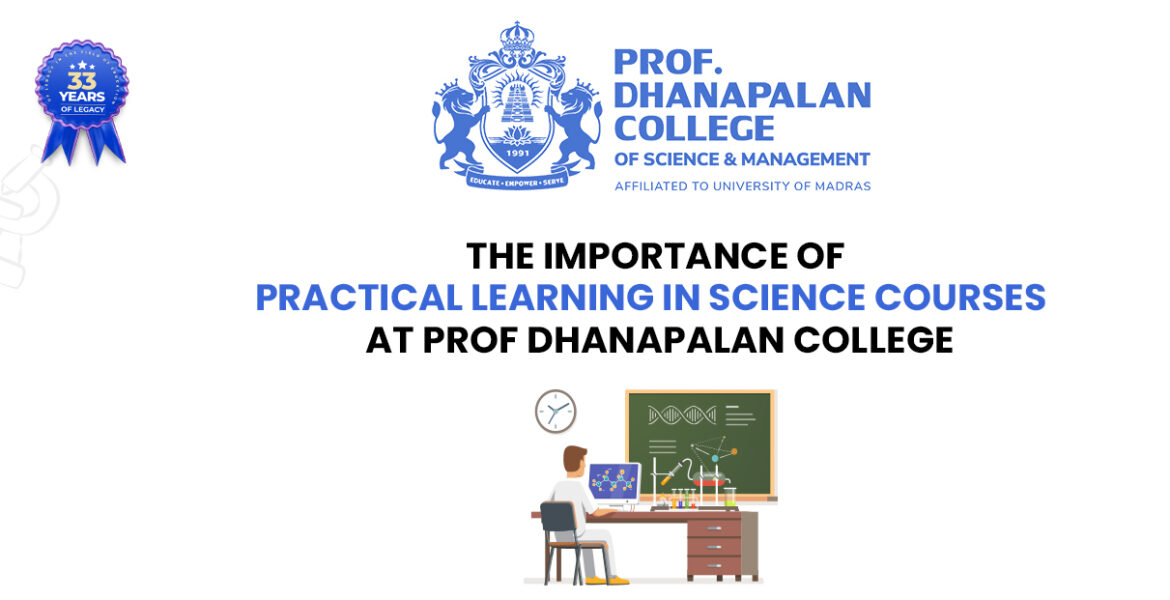The Importance of Practical Learning in Science Courses at Prof. Dhanapalan College
January 21, 2025 2025-01-21 17:12The Importance of Practical Learning in Science Courses at Prof. Dhanapalan College

The Importance of Practical Learning in Science Courses at Prof. Dhanapalan College
The Importance of Practical Learning in Science Courses at Prof. Dhanapalan College
Science is a subject that comes alive through experimentation and observation. While theoretical knowledge provides a strong foundation, it is through practical application that scientific concepts truly solidify and become meaningful. At Prof. Dhanapalan College, the emphasis on practical learning in science courses is paramount, ensuring that students gain a comprehensive understanding of scientific principles and develop essential skills for future endeavors.
Bridging Theory and Practice
Science courses at Prof. Dhanapalan College seamlessly integrate theory with practical learning. Students are not merely expected to memorize facts and formulas; they are actively engaged in hands-on experiments, laboratory work, and field studies. This approach fosters a deeper understanding of scientific concepts by allowing students to:
- Observe Phenomena: Direct observation of scientific phenomena helps students connect abstract theories with real-world applications. For instance, in physics, students can observe the principles of motion by conducting experiments with pendulums and inclined planes.
- Develop Experimental Skills: Laboratory work provides students with valuable opportunities to develop essential experimental skills such as observation, measurement, data collection, analysis, and interpretation. These skills are crucial for scientific research and innovation.
- Problem-Solving and Critical Thinking: Practical learning encourages students to think critically and apply their knowledge to solve real-world problems. They learn to identify variables, design experiments, analyze data, and draw conclusions based on evidence.
- Enhance Creativity and Innovation: Practical learning fosters creativity and innovation by encouraging students to explore different approaches, think outside the box, and develop novel solutions to scientific challenges.
State-of-the-Art Facilities
Prof. Dhanapalan College is equipped with state-of-the-art laboratories and facilities that provide an ideal environment for practical learning. The science laboratories are well-equipped with modern instruments, apparatus, and technology, enabling students to conduct a wide range of experiments and research projects. The college also provides access to research databases, online resources, and industry collaborations, further enriching the learning experience.
Experienced Faculty
The faculty at Prof. Dhanapalan College comprises experienced and qualified professionals who are passionate about teaching and research. They guide students through the learning process, provide personalized attention, and encourage critical thinking and independent learning. The faculty members also act as mentors, guiding students in their research projects and preparing them for future careers in science and technology.
Beyond the Classroom
The emphasis on practical learning extends beyond the classroom at Prof. Dhanapalan College. The college encourages students to participate in science fairs, research competitions, and industry internships, providing them with valuable opportunities to apply their knowledge and gain real-world experience. These experiences not only enhance their learning but also prepare them for successful careers in science and technology.
In conclusion, the focus on practical learning in science courses at Prof. Dhanapalan College is a testament to the institution’s commitment to providing a holistic and enriching educational experience. By bridging the gap between theory and practice, the college empowers students to become critical thinkers, problem-solvers, and innovators, preparing them to excel in the ever-evolving fields of science and technology.

